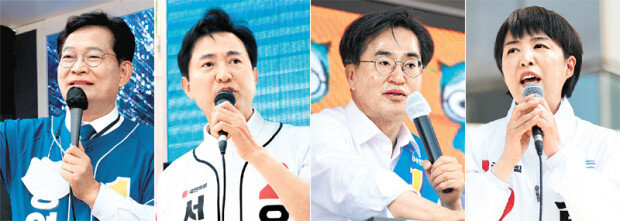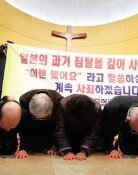Election day for 4,125 local government leadership
Election day for 4,125 local government leadership
Posted June. 01, 2022 07:24,
Updated June. 01, 2022 07:39

The morning of election day to vote for local government leadership to be in charge of the administration of regional affairs for the next four years has broken. The ruling and opposition parties conducted the official election campaigns until last day, pleading with voters to cast votes for their respective candidates. The People Power Party pleaded with voters to replace local government leaders for a successful presidency of the Yoon Suk-yeol administration, arguing that the transformation of the government can truly be completed with substitution of local government leaders, while the main opposition Democratic Party of Korea urged voters to give their competent leaders who got elected four years ago to work again for the country.
At the June 1 local elections, voters will cast for a total of 4,132 public officials, including: 17 metropolitan mayors and provincial governors and superintendents of local education offices; 226 city mayors, heads of counties, and heads of district offices; 872 members of provincial and metropolitan councils; 2,988 members of district offices; five members of the board of education; and seven lawmakers to fill vacant National Assembly seats as a result of candidacy for local elections. The number of total candidates amounts to 7,616, with an average competition rate of 1.8 to 1. Of note, the number of city and provincial government members and members of city/gun/district offices, who will be practically in charge of administering budgets and local affairs, is 3,860 in aggregate, taking up 93.4 percent of the total election apportionment. The seats of local government councils garner less attention compared to that given to metropolitan mayors and provincial governors, but their importance is no way less important considering the role they play, for example, by legislating ordinances, and the impact they can have upon voters’ lives.
The ruling and opposition parties have carried an all-out war, viewing that this year’s local election, which is taking place in 84 days since the March 9 presidential election, is an early assessment of the new administration. If the ruling party wins the local election, it will secure a stable source of power to run state affairs, whereas the opposition party’s victory, which will outrun the ruling party both in the National Assembly and local governments, may strengthen further the check and balance against the new government.
The People Power Party’s objective is to take up at least nine seats for the heads of local metropolitan governments and put pressure on the main opposition Democratic Party. The ruling party made sure it did not become complacent about the optimistic outlook over poll results showing predominance of the ruling party. “Only the voting public is a real number we can count on; those who do not cast votes are the same as abstention. We cannot afford to be complacent,” said Kwon Seong-dong, the ruling party’s floor leader.
The Democratic Party is fighting with its back to the wall, determined to take hold of at least two seats for the heads of local governments, along with the ones in its traditional strongholds, Gwangju, South Jeolla, and North Jeolla Province, and Jeju. Kim Min-seok, the co-chair of the Democratic Party’s general headquarters, said that its goal is to hold a firm victory in at least four metropolitan mayoral and gubernatorial races, and that it would be a huge victory for the party if it wins five to six mayoral and gubernatorial positions.
The 2022 Local Election will kick off at 6 a.m. at 14,465 polling stations nationwide and run until 6 p.m. Eligible voters can cast their ballots at their designated polling stations. COVID-19 patients and those in quarantine are allowed to vote between 6:30 p.m. to 7:30 p.m. at their designated polling stations.
Kyung-Suk Kang coolup@donga.com







